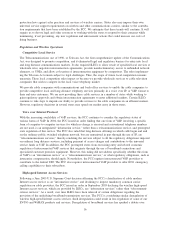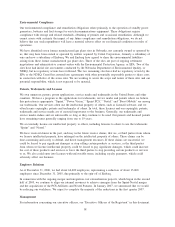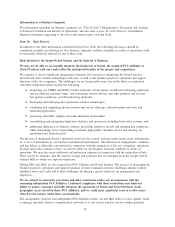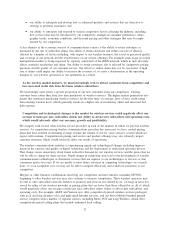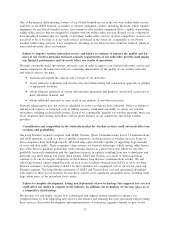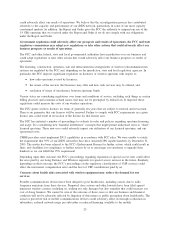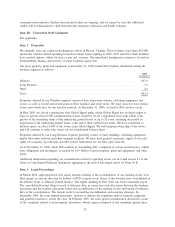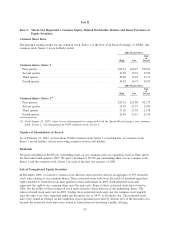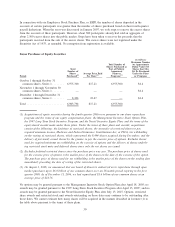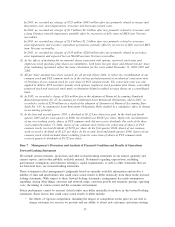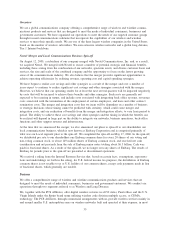Sprint - Nextel 2006 Annual Report Download - page 27
Download and view the complete annual report
Please find page 27 of the 2006 Sprint - Nextel annual report below. You can navigate through the pages in the report by either clicking on the pages listed below, or by using the keyword search tool below to find specific information within the annual report.could adversely affect our results of operations. We believe that the reconfiguration process has contributed
adversely to the capacity and performance of our iDEN network, particularly in some of our more capacity
constrained markets. In addition, the Report and Order gives the FCC the authority to suspend our use of the
1.9 GHz spectrum that we received under the Report and Order if we do not comply with our obligations
under the Report and Order.
Government regulation could adversely affect our prospects and results of operations; the FCC and state
regulatory commissions may adopt new regulations or take other actions that could adversely affect our
business prospects or results of operations.
The FCC and other federal, state and local governmental authorities have jurisdiction over our business and
could adopt regulations or take other actions that would adversely affect our business prospects or results of
operations.
The licensing, construction, operation, sale and interconnection arrangements of wireless telecommunications
systems are regulated by the FCC and, depending on the jurisdiction, state and local regulatory agencies. In
particular, the FCC imposes significant regulation on licensees of wireless spectrum with respect to:
khow radio spectrum is used by licensees;
kthe nature of the services that licensees may offer and how such services may be offered; and
kresolution of issues of interference between spectrum bands.
Various states are considering regulations over terms and conditions of service, including such things as certain
billing practices and consumer-related issues, that may not be preempted by federal law. If imposed, these
regulations could increase the costs of our wireless operations.
The FCC grants wireless licenses for terms of generally ten years that are subject to renewal and revocation.
There is no guarantee that our licenses will be renewed. Failure to comply with FCC requirements in a given
license area could result in revocation of the license for that license area.
The FCC has initiated a number of proceedings to evaluate its rules and policies regarding spectrum licensing
and usage. It is considering new “harmful interference” concepts that might permit unlicensed users to “share”
licensed spectrum. These new uses could adversely impact our utilization of our licensed spectrum, and our
operational costs.
CMRS providers must implement E911 capabilities in accordance with FCC rules. We were unable to satisfy
the requirement that 95% of our iDEN subscriber base have Assisted-GPS capable handsets by December 31,
2005. The matter has been referred to the FCC’s Enforcement Bureau for further action, which could result in
fines, new deadlines for compliance or further actions by us to encourage our customers to upgrade their
handsets so we can fulfill the 95% requirement.
Depending upon their outcome, the FCC’s proceedings regarding regulation of special access rates could affect
the rates paid by our Long Distance and Wireless segments for special access services in the future. Similarly,
depending on their outcome, the FCC’s proceedings on the regulatory classification of VoIP services could
affect the intercarrier compensation rates and the level of USF contributions paid by us.
Concerns about health risks associated with wireless equipment may reduce the demand for our
services.
Portable communications devices have been alleged to pose health risks, including cancer, due to radio
frequency emissions from these devices. Purported class actions and other lawsuits have been filed against
numerous wireless carriers, including us, seeking not only damages but also remedies that could increase our
cost of doing business. We cannot be sure of the outcome of those cases or that our business and financial
condition will not be adversely affected by litigation of this nature or public perception about health risks. The
actual or perceived risk of mobile communications devices could adversely affect us through a reduction in
subscribers, reduced network usage per subscriber or reduced financing available to the mobile
25



